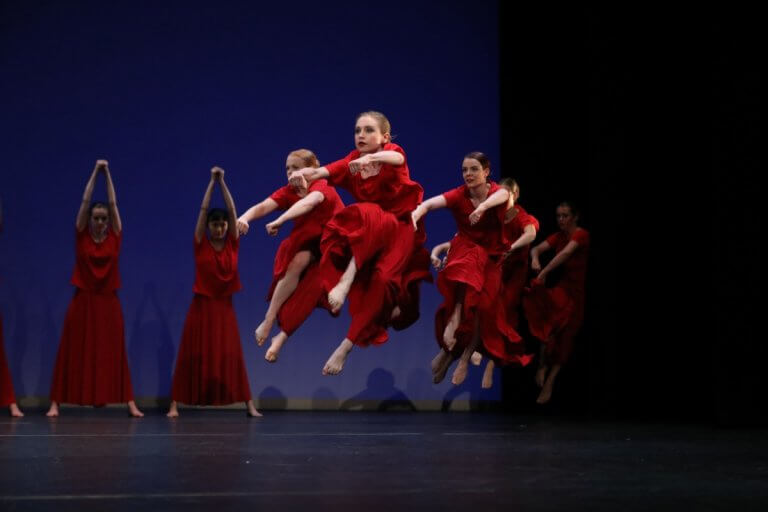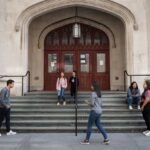
Offering foundation, undergraduate and postgraduate programmes in music, dance and musical theatre, Trinity Laban is a fantastic option if you want to train in the performing arts or its related industries.
As London’s Creative Conservatoire, Trinity Laban will help you find your artistic voice and forge your own unique career path. You will receive one-to-one training with teachers who are leaders in their fields, and have numerous opportunities to perform and work with peers and professionals across different art forms. This has given plenty of graduates, such as Sir Matthew Bourne OBE, James Newby and Zoe Rogers, a platform from which to succeed.
You will train as a world-class performer in a range of inspiring settings. For example, the Faculty of Music is housed on a UNESCO World Heritage Site in Greenwich, and the Faculty of Dance is an award-winning building designed by Swiss architects Herzog & de Meuron who redeveloped Tate Modern in London.
International students also receive specialist English language support, and can take dedicated study programmes to help them boost their English language skills before starting a degree.
These are some of the reasons why Trinity Laban was nominated for a Global Excellence Teaching Award in 2018.
Undergraduate life
Undergraduate programmes at Trinity Laban give students a solid grounding in their chosen field.
Isolde Allen graduated from the undergraduate BA (Hons) Contemporary Dance course in 2018. She was taught key dance concepts and theories that shaped her creative thought, and she also built relationships with performers around the world.
She particularly enjoyed CoLab: a Trinity Laban initiative allowing students to learn about other art forms through the development of cross-faculty performance projects.

Isolde Allen’s Historical Project piece
CoLab for me was one of the most exciting and challenging parts of my training. In the first year I was part of a project that involved singers and dancers – we experimented with voice and movement, learning how different movements can affect the sounds that your voice can create and vice versa.
“In the second year, I was involved in a project that allowed me to work with dance students from Korea National University of Arts (K-ARTS). The Korean students didn’t speak English and we didn’t speak Korean, so we spent the week collaborating and choreographing without words. It was challenging at times, but it was so rewarding when we created the final piece,” Isolde explains.
Isolde’s second-year Historical Project was particularly memorable.
“I played the lead role of The Sylph in a re-staging of Matthew Bourne’s Highland Fling. It was the first time I felt truly in the spotlight, with the combination of the external directors and the fact that we were dancing such iconic choreography. It made me realise what I was capable of – and that was a powerful feeling.”
Continuing her journey at Trinity Laban, Isolde’s commitment illustrates the lifelong connection many students have with the conservatoire.
“My plans for the future are still quite open. I am currently doing a Graduate Internship at Trinity Laban which is a new path for me that I’m really enjoying and living in London is amazing! My most memorable moments have been experiencing the culture of the city with the friends I made at Trinity Laban, seeing performances and exhibitions, attending marches and exploring the different boroughs,” Isolde concludes.
The postgraduate experience
Postgraduate options at Trinity Laban give you the opportunity to develop your professional skills to an advanced level.
Having launched the world’s first dance science masters programme in 2001 Trinity Laban is an established pioneer within the field. On this course, you will investigate ways to optimise dance performance, reduce injury and explore the impact of dance on other populations.

Lucy Lisher
MSc Dance Science student Lucy Lisher shares her insight.
“My first day at Trinity Laban felt familiar and comfortable. After attending public classes and working with the school for a year before, studying here just felt right.”
The most memorable class for Lucy was testing the VO2 Max – the measurement of the maximum amount of oxygen a person can use during intense exercise.
Though tough at times, she found using the equipment and examining the respiratory system really interesting and was eager to see how this would be used in a dance environment setting.
“From doing a BA in dance, my knowledge of science and anatomy of dance was very limited. With Trinity Laban’s support, I worked through it and surprised myself with the grades I received back, inspiring me to continue.”
Laying the foundations for your career, Trinity Laban is regularly named one of the UK’s top institutions for graduate employability.

“Trinity Laban has opened up many opportunities and career possibilities,” Lucy continues. “My career plan is to always work in an international performing arts environment. After working at Trinity Laban for a year I know I love working in a higher education setting, and an institution that supports the arts is key to this.”
Lucy also enjoys engaging with the vibrant community of students at Trinity Laban.
“My study programme is very diverse in terms of nationalities. My classmates are from a range of different backgrounds, which means they have varying experiences and opinions. This leads to interesting class debates, which has enriched my learning experience.”
If you’re ready to develop lasting friendships and artistic connections in a diverse learning environment, contact Trinity Laban today!
Follow Trinity Laban on Facebook, Twitter, YouTube, Vimeo, Soundcloud, WordPress and Instagram
Liked this? Then you’ll love…
Trinity Laban: Audition for London’s Musical and Creative Conservatoire
What are the skills students need to become leading contemporary dancers?







